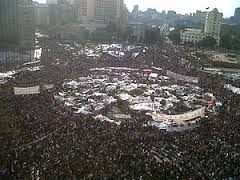Storm over Egypt
 Sophie Katz extends her first commentary on the situation in Egypt. It is often a mistake to comment from afar but the British media is so appalling and the Internet so full of trash it is difficult to hear genuine voices from the Egyptian left in these crucial hours. But great events pile on great events. The people are loosened from the stays of everyday life. Even from afar and with the little nuggets of political wisdom that we can glean from the country, we must discuss and try to form a picture. Otherwise socialists are nothing but a part of the gawping spectators offered media drivel and sentimental cliché to grapple with.
Sophie Katz extends her first commentary on the situation in Egypt. It is often a mistake to comment from afar but the British media is so appalling and the Internet so full of trash it is difficult to hear genuine voices from the Egyptian left in these crucial hours. But great events pile on great events. The people are loosened from the stays of everyday life. Even from afar and with the little nuggets of political wisdom that we can glean from the country, we must discuss and try to form a picture. Otherwise socialists are nothing but a part of the gawping spectators offered media drivel and sentimental cliché to grapple with.
The army took power precisely because President Morsi could not stop the revolution – even using the mass base of the Muslim brotherhood for that purpose – as Morsi tried to do. The multi-millionaire generals are not powerful enough at the moment to act independently in the heat of the mass mobilisations, but they should not be confused as any source of progress. Despite the cheers in Tahrir Square for the coup, they defend big capital. They want ‘stability.’ They have vast wealth to protect.
The Brotherhood had mobilised wide layers of Egyptian society, including big sections of the peasantry and the urban small owners who were, and are, beginning to challenge their own social and economic circumstances. Their movement fully backed the overthrow of Mubarak. They still saw Morsi as their friend and supporter. But in revolutionary times, when the people are mobilised, history uses up leaders very quickly. The leadership of the Brotherhood who are deeply unhappy with the idea of social justice married to political freedom, was under strain as the resignations from Morsi’s cabinet showed. The mainly urban educated layers, working class contingents and the youth got there quicker than the base of the Brotherhood, whose leaders continue to restrain the aspirations of their base. But both parts of this population, together, must constitute the revolutionary whole. While the removal of Morsi was an act of revolution that could not and should not have been held up to take account of the political psychology of less advanced sectors of the population, the danger for the revolution in all this is now clear.
The leading role of the Cairo, of the urban working class and the socialists has never been more required than now in this critical phase of the revolutionary upsurge. Their platform could be the unity of all those seeking social as well as political justice – for the unity of all the revolutionary forces in Egyptian society. Parliament failed the revolution before. Popular assemblies now need to be built to discuss a new constitution, based on political and religious and cultural and gender and sexual – orientation freedoms. But also based on social and economic justice for all.
Great masses of Egyptian people have moved to create their own destiny. This was always going to be an enormous risk and involve a challenge to all of the institutions and classes in Egyptian society. The risk now is the entrenchment of the Army in the leadership of society and the division of the necessary social forces to carry through the revolution. How will the new revolutionary leaderships springing up deal with those risks; keep the army marginal to the process; knit together the majority needed to safeguard the future of the revolution? These are the great questions.
2 comments
2 responses to “Storm over Egypt”
Left Unity is active in movements and campaigns across the left, working to create an alternative to the main political parties.
About Left Unity
Read our manifesto
Left Unity is a member of the European Left Party. 
Read the European Left Manifesto
ACTIVIST CALENDAR
Events and protests from around the movement, and local Left Unity meetings.

Saturday 10th January: No to Trump’s war on Venezuela
Protest outside Downing Street from 1 to 3pm.
More events »
GET UPDATES
Sign up to the Left Unity email newsletter.
CAMPAIGNING MATERIALS
Get the latest Left Unity resources.



A good, strong, analysis, Sophie. See my comment to your earlier post.
Glad you’ve shifted from put-down to patronising-Penney, John boy. See my comment to your earlier post.
More to the point, “…the new revolutionary leaderships springing up…” – same old, same old. There may be some of this, we’ve not dumped the old trotty/staly (even Yeltsy!) ways yet, but one of the fantastic things about these uprisings are their leader-less quality. Yes it is early days and I’d agree, Sophie that – given this new context – the big question is whether our sisters and brothers will be able to “knit together the majority needed to safeguard the future of the revolution”. One of the challenges will be for enough people to agree on its aims.